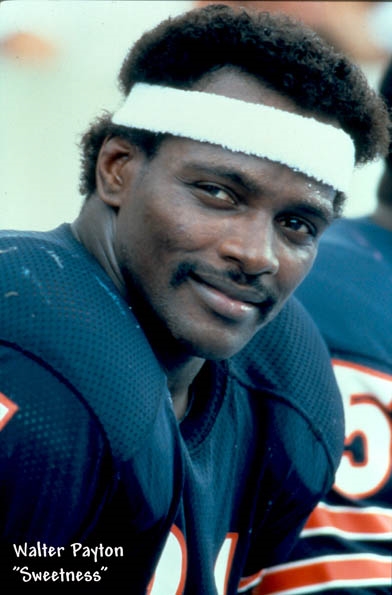 |
| Walter Payton (minardi-photo.com) |
A hero to me is someone who has changed the fate of many by inspiring them to do something that at the current time was unheard of. In Walter Payton's case, it was to pave the way for other young black athletes in a game that was created by whites and mainly played by whites. He proved that, regardless of his color, he could overcome the bigotry and do something great for himself and his race. He also showed people that blacks could excel in anything that white people could, and in the 70s that was an incredible statement to be made.
Walter Payton was born in 1954 in Mississippi. Although he accomplished so much, tragically, the life of this hero was too short. In 1999 he was diagnosed with liver cancer, and within a few weeks it claimed his life. Now, six years after his death, only 2 out of his 12 records have been surpassed. He is undoubtedly the greatest rusher of all time. I remember when I was a kid watching highlights of Walter Payton. The simple finesse he displayed on the football field inspired me to play and do something great. He also taught me that you could come from nothing and make your life into something. This is another vauluable lesson I learned. Walter Payton had touched so many people by the time he died. The power to inspire and reach people with his thoughts even years after his death is admirable.
When Walter Payton came up the football ranks, it was a harsh time for blacks because of the racism. I was watching ESPN classics and the coaches were saying how they wouldn't give black players what they called smart positions, which basically meant that blacks were getting all the positions on the offensive and defensive line. It was unheard of for there to be a black quaterback and rare for there to be a black running back. But after Payton shined on the field playing different positions, coaches realized that blacks could also be talented playing other positions. As an example, the Bears would run a flea flicker and Payton would bomb it for a touchdown, or they would use him as a wide receiver and he would catch it and score a touchdown. This helped his race by opening coaches' minds about colored players. While there weren't any black quarterbacks in the 70s, nowadays there are a lot.
When Walter died, so did many peoples' childhood memories of him running gracefully across the field. But in honor of this great man's legacy, his wife established the Walter Payton Cancer Fund to help find a cure for cancer. So, even to this day six years after his death, he is helping people with cancer, an incredible achievement that he will never even know he accomplished. Walter Payton is gone, but not forgotten.
Page created on 7/2/2010 2:35:12 PM
Last edited 7/2/2010 2:35:12 PM
